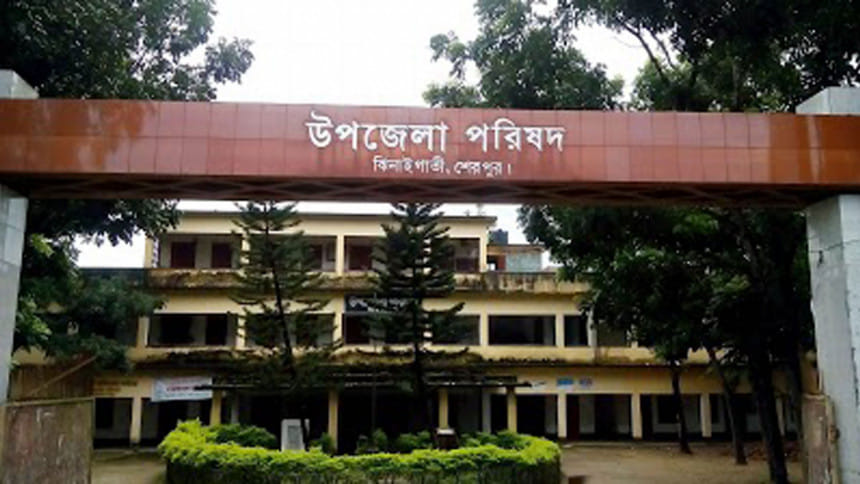Empowerment of upazila parishad remains elusive

Under the law, upazila chairmen hold executive power to run the local affairs. But in reality, Upazila Nirbahi Officers, who are appointed to provide secretarial support, exercise power beyond their jurisdiction in many cases.
As a result, Upazila Parishads, a crucial tier of the local government system, cannot often function properly and provide expected services to the public, experts have said.
More than a decade ago, the incumbent government enacted the Upazila Parishad Act, giving control on 17 departments under various ministries at upazila level. These departments deal with the different local issues.
But the "empowerment" of Upazila Parishad envisioned in the law has never materialised.
In September 2021, the High Court ordered the cabinet secretary to take necessary measures to "empower" UP chairmen following the circulars issued {by whom} in this regard on different occasions. Subsequently, the cabinet formed a committee to find out how this can be done.
In response, the committee recommended withholding all previous circulars relating to the empowerment of UP chairmen, terming the circulars "vague" and "incongruent," a cabinet division official said.
The upazila system was introduced in 1982 by HM Ershad's autocratic government. The system collapsed with the fall of Ershad in 1990.
In 1998, the Awami League enacted legislation to reintroduce the Upazila system but no election was held. The military-backed caretaker government promulgated the Upazila Parishad Ordinance 2008 repealing the Upazila Parishad Act 1998.
However, the ordinance was again repealed by the Upazila Parishad (Reintroduction of the Repealed Act and Amendment) Act 2009 by the Awami League government.
But these amendments did little to reduce the influence of administration officials in the local government.
On September 1 this year, the Local Government Division formed a nine-member upazila survey and settlement committee putting UNOs as its president and chairmen as advisers. The committee was formed to look after survey work [what survey].
It is not an isolated example where the local elected representatives are made to look inferior to the admin officials.
"We are never invited to the meetings of these committees," said Saiful Islam Khan Biru, a five-term Chairman of Monohardi Upazila in Narsingdi.
The UNOs do not even consult them about the government's development plan.
This lack of coordination affects the local communities who are deprived of various government services.
Citing an example, Saiful said he went to visit Monohardi Upazila Health Complex a few days back and found three to four doctors out of the seventeen appointed there.
"When I asked about the rest, they said some are in meetings in Dhaka or are at the DC office. Some are on leave," he said.
According to him, if upazila chairmen were empowered, the doctors and other local government officials would be accountable to local elected representatives.
"You will find many chairmen who do not have proper education. Besides, there are many who become chairman without a vote and are famous for hooliganism," said an additional secretary, explaining why upazila chairmen are not empowered.
"A UNO is an educated and qualified person. How can you expect an educated person to work under them?" he said.
A corrupt chairman will either turn an officer corrupt or prevent them from doing their job properly.
"In many cases we find allocation was made for public roads but the chairman either pocketed the fund or built roads to serve their family interest," the official added.
Sources said officials of the 26th batch earlier opposed work as secretary under the zila parishad chairman.
"We also have to consider these things," he said.
The sub-committee of upazila parishad recommended making the decision considering all aspects and reality of the country.
Local government expert Dr Tofail Ahmed pointed out a multifaceted problem that impedes the strengthening of the upazila parishad.
Unions are under upazila, but upazila chairmen have little regards for union chairmen, municipality mayors and other members. The same goes for the union parishad chairmen.
"Upazila chairmen are more concerned about their power and benefits rather than making the parishad administratively strong. Backed by the central government, UNOs, on the other hand, consider themselves bosses of the upazila," he said.
Organisational weakness coupled with power conflict and apathy of the government are major reasons for the weak local government system.
Underscoring the need for farsighted planning, he said, "Instead of separate acts, there should be a uniformed act for all local parishads, which will operate like a parliamentary system for effective governance," he added.
LGD Minister Tazul Islam admitted that there are some problems and that they are working to solve them.
He suggested that both UNOs and local government representatives refrain from a bossy mentality. "When two people work together, some issues may arise. Both parties need to demonstrate tolerance and solve problems amicably," he said.
When his attention was drawn about the act which gives executive authority to chairmen instead of UNOs, he said, "Forceful enforcement of the Act may not bring fruitful results. It may create an adverse impact."

 For all latest news, follow The Daily Star's Google News channel.
For all latest news, follow The Daily Star's Google News channel. 



Comments